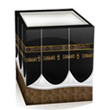What is permissible during travels?
- Details
- Category: Sheikh Otheimin
- Published on Tuesday, 12 November 2013 11:41
- Hits: 896
What is permissible during travels?
Question:
What is permissible during travels?
Answer:
There are four things permissible during travels:
i. The prayers consisting of 4 Raka'hs are shortened to 2 Raka'hs.
ii. Breaking the fast during Ramadhaan, making the same number of days up during other days.
iii. Wiping over the Khuffs 3 days and nights, beginning from the first time the person wipes over them.
iv. The recommendation for the Sunnah prayers of Dhuhr, Maghrib, and Ishaa is lifted. As for the Sunnah prayer of Fajr and the rest of the optional prayers, performing those remains legislated and preferred.
So the traveler prays the night prayer, the Sunnah prayer of Fajr, the two Rak'ahs of Dhuhaa, the Sunnah prayer after making Wudhoo, the two Rak'ahs of entering the masjid, and the two Rak'ahs of arriving from a journey - for surely, from the Sunnah is that when a person arrives from a journey, before he enters his house, he first begins with the masjid, entering it and praying two Rak'ahs in it. [1]
Likewise, the rest of the optional prayers remain legislated with regards to the traveler except for what I have previously said, and they are: the Sunnah prayers of Dhuhr, Maghrib, and Ishaa because the Prophet (Õáì Çááå Úáíå æÓáã) used not to pray these three optional prayers (while traveling).
NOTES
[3] This has been reported in the long Hadeeth of K'ab ibn Maalik regarding his repentance with the wording, "He used to, when he arrived from a journey, begin with the masjid, praying two Rak'ahs in it." Reported by al-Bukhaaree, no. 4418 and Muslim, no. 2769.
Shaykh Muhammad bin Saalih al-`Uthaymeen
Fataawaa Arkaan al-Islaam, Number 315





















